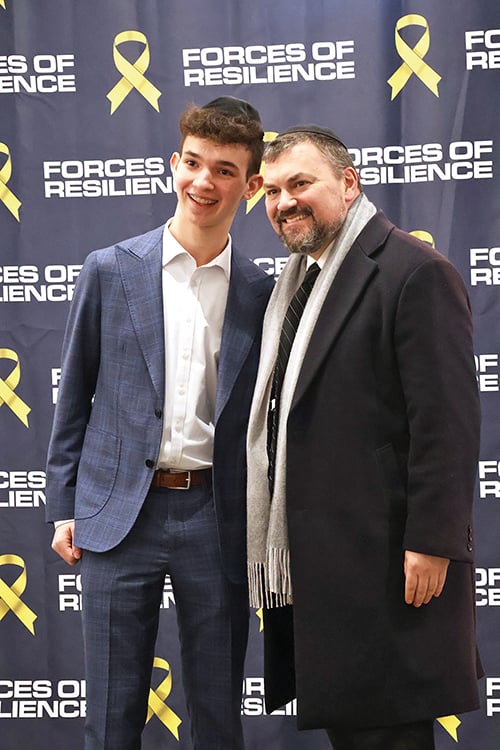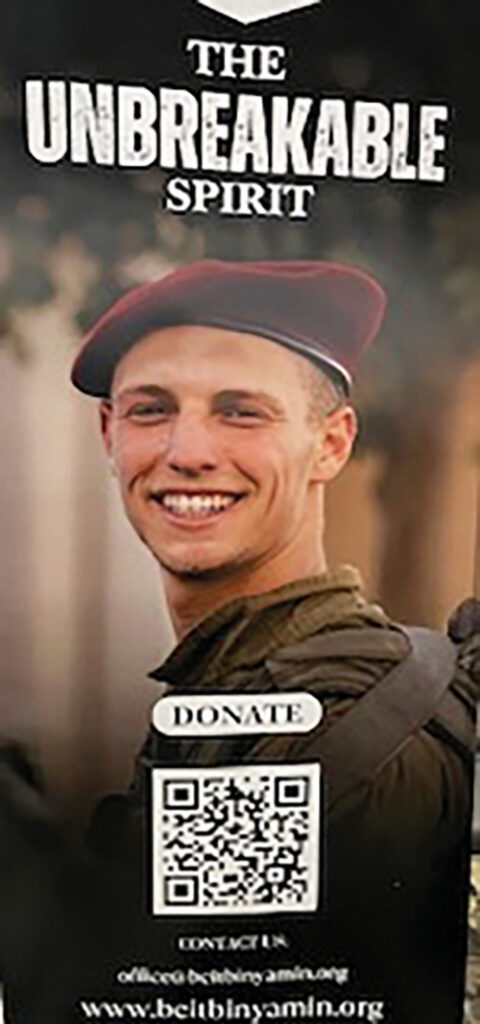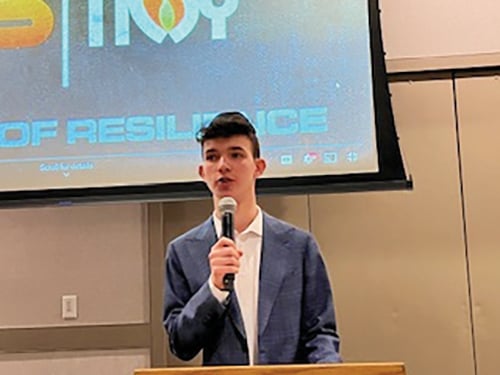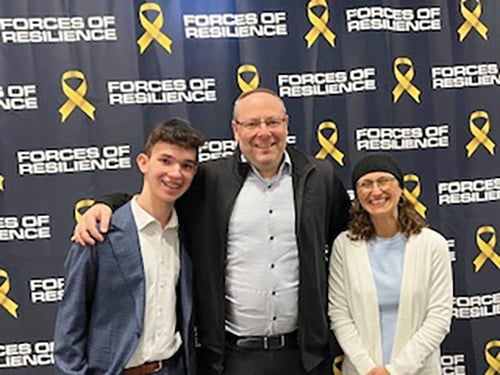Magnum opus documentary by 14-year-old filmmaker chronicles aftermath of Oct. 7

“The question that I’ve been asked hundreds of times is ‘Why? Why did I choose to produce “Forces of Resilience?’” The opening remarks of a remarkable, no, incredible, young man, Hillel Kornwasser, prior to the debut of his documentary short, “Forces of Resilience,” which was screened Sunday night, Dec. 22, at Cong. Rinat Yisrael in Teaneck.
The sobering chant of “Bring Them Home” resounded amidst the capacity audience as Rabbi Gideon Black, regional director of NCSY, opened the program with Tehillim and tefillot for chayalei Tzahal and the hostages.

Hillel Kornwasser then took the podium, an unassuming high school freshman, to unpack the backstory. “Last February I was in Israel for a friend’s bar mitzvah. Our family decided to do various chesed activities around the Oct. 7 massacre. ‘What’s this trip gonna be like? Scary? Sad?’ It was the final day of our trip and I still didn’t have an answer to that question.” The last stop of the trip was at Ichalov Hospital, one of the recovery centers for injured soldiers. He shared with the audience about meeting Rachamim, the inspirational soldier who soon became the answer to his question.
Rachamim, 28 years old, greeted them with a smile and a hug but didn’t say a word for 40 minutes. Rachamim had incurred a shrapnel wound on Oct. 7 and was unable to speak. He typed everything and that’s how they communicated, smiling the entire time. Hillel recalled, “I asked myself: ‘How could he be smiling if he can’t talk, stuck in this hospital for months?’”

Hold that thought…
This experience answered his question in a bigger way than he ever imagined. And the rest, as they say, is history.
Hillel’s takeaway from meeting Rachamim became his mantra. Quoting Joey Newcomb’s beautiful song, “You Fall Down, You Get Back Up,” Hillel said, “The true message of resilience is: ‘You fall down, you get back up.’ If they can do it after their biggest nightmare, there should be no doubt that we can get back up as well. As I walked out of the hospital, I wanted to do something more; I didn’t want my experience to just end there. I explored different ways to bring my experience back to America.”
Eventually he partnered with NCSY and the idea for “Forces of Resilience,” was born. “With the rise of antisemitism, Jewish youth need the push to stay strong and resilient. That’s what NCSY is all about,” said Hillel, who set out to accomplish his goal of inspiring teens across the globe, attributing considerable credit for his success to Natan Cohen of NCSY. Day in and day out Cohen answered calls and texts, an endless stream of ideas and pathways about how to make “Forces of Resilience” the best piece possible.

So he returned to Israel, this time not for a bar mitzvah but to script, produce, direct, chronicle and record what would become his first documentary, “Forces of Resilience.” Not the typical pursuit of your average 14-year-old high schooler.
Rabbi Aryeh Stechler, rosh yeshiva and dean of Heichal HaTorah in Teaneck, where Hillel is a student, conveyed glowing remarks about the young filmmaker. “It is remarkable that a ninth grade student undertook the task of creating a film about the resilience of our people. The manner in which he interviewed adults and assisted them in sharing their missions is reminiscent of someone 20 years older than he.”
Responding to what resonated most about the project, Hillel answered, “The most inspirational part of creating the film was seeing how each of these amazing individuals are different from one another, each possessing a unique strength. They come together in the end to create a force of resilience, the model for what makes the Jewish nation strong, uniting our strengths.”

Hillel also commented that the most challenging part was balancing school and his personal life but quipped, “It was 1,000% worth it to drop a couple points for this!” By his own assessment, he recommended the documentary for middle schoolers and older as there is no specific violent graphic material. “But we do explore sensitive topics,” he said.
Summing up he noted, “Most of the featured guests in the film have fallen in an unimaginable way, yet they got back up and are much stronger. So I would encourage using that as your inspiration. After watching this film, I encourage you to find your own force that continues to make our nation resilient.”
Circling back to release the “hold key” on the story of Rachamim, fast forward to Yom Tov this year. The Kornwassers are sitting in their sukkah in Baka in Israel with a recovered Rachamim Yishai who is now able to talk fluently.
“You fall down; you get back up! We, the Jewish people, are the most resilient nation,”
Hillel said, closing his remarks by thanking his siblings for putting up with him practically taking over the whole house to turn it into a studio. “And lastly, to the most loving, caring and helpful parents in the world! Mommy and Daddy, you’ve been the most supportive parents I could ask for!”
Next, he introduced Jen Airley, who has been speaking in communities across the globe, touching the hearts of people everywhere in her wake and becoming a resounding voice of Am Yisrael. Airley and Hillel met during the summer at Camp Kaylie where they connected and have since built a relationship.

Jen and her husband Rob, residents of Ramat Beit Shemesh, lost their oldest son, Binyamin, H”YD, during a terrorist engagement in Gaza. Remarkably, they have used their energy as a springboard for bringing both chizuk and relief to Israelis struggling with the ravages of trauma created by the attacks and the war. The couple has created “Beit Binyamin” to honor the memory of their son, which “offers respite, relaxation and recovery to combat soldiers, bereaved and displaced families, and anyone suffering from the traumatic effects of the war.”
Airley’s message is inspirational and upbeat. Of small stature, she had some big things to say. The family has transformed the energy of grief into chesed by supporting others who struggle with the challenges and the toll that the war and its ravages have imparted upon them.
She was resolute and spoke first directly to Hillel, who was sitting to her right in the front row. Their eyes locked as she first lauded him for his approach to the issue, acknowledging the family doctrine of “What’s the challenge?” rather than “What’s the problem?” Aligning Hillel’s efforts with her own family, she spoke of transforming sorrow into a force of “What can we do for Israel, putting force behind a product.” She alluded to the many miracles experienced in the war, comparing them to the miracles of Chanukah and its war but with some significant differences. “We are all soldiers now. Fight with whatever you have: tzedaka, tefillah, bitachon, emunah—and Hashem also fights for us.”
And some things have changed since the ancient war of the Maccabees. “While we are still the few against the many, the holy against the profane, the good against evil, we are no longer the weak against the strong! We are now the strong!” Airley concluded.
The documentary itself was a masterpiece and no one would guess it was done by a rising high school freshman. Hillel’s content and composure as well as videography and production skills are amazing; highly recommended viewing.
The evening was jointly sponsored by NCSY, Bergen News Network, JewishBreakingNews.com, Yeshiva League PASS, and Only Simchas.
To donate to Beit Binyamin, visit their website at beitbinyamin.org/#.
To view “Forces of Resilience,” visit ncsy.org/forcesofresilience.








